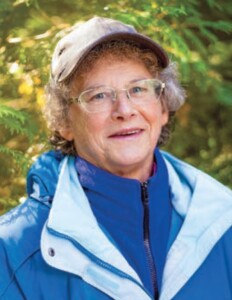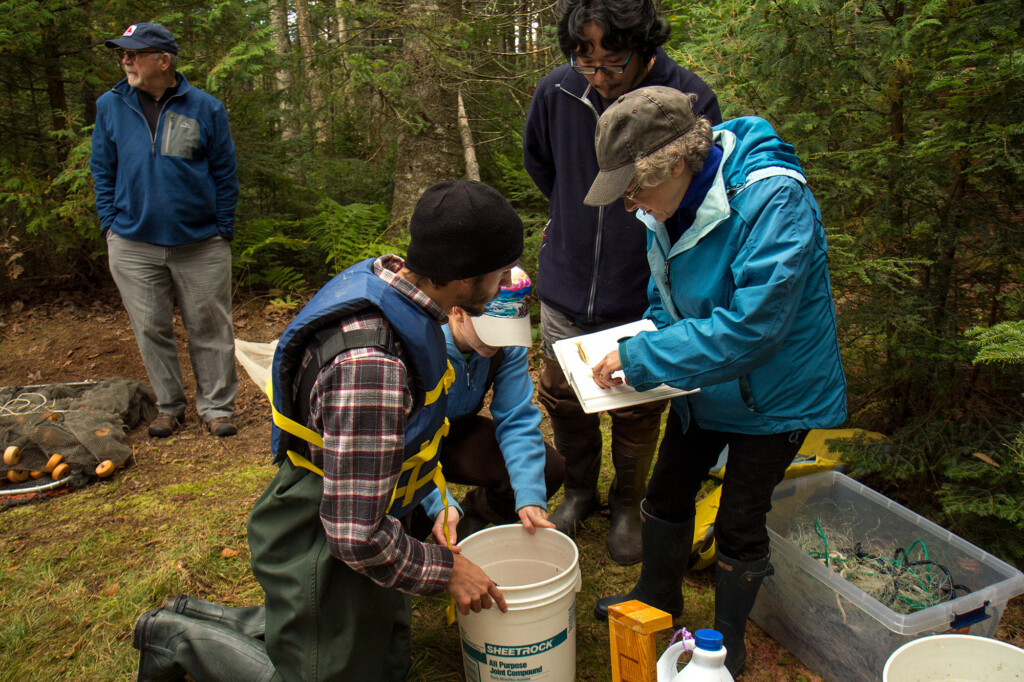
Karin Limburg
Growing up, Karin Limburg’s mother would take her children down to a pond and scoop “stuff” from the muck which they would take
home and put in an aquarium to study. Her mother, who hailed from Sweden, prepared fish often for the family and Limburg spent many hours fishing with her father and uncles.
“Those kinds of experiences are formative,” said Limburg, ESF’s newest member of the SUNY Distinguished Academy. “The things that we did as a child I think
have a really important effect on how you view the world.”
In her master’s program at the University of Florida, Limburg did theoretical work on food webs but wanted to work with a more concrete resource for her Ph.D at Cornell University, one that would bring humans into the equation. She looked to the roots of her childhood to find that area.
“People understand the importance of fish. It’s something that’s very emotional, something people get attached to,” she said. “When you think about the ways to interact with people about natural resources, fish is a good vehicle.”
Today Limburg in an internationally recognized scholar in fisheries ecology. When she was honored as a Distinguished Professor this spring, then-interim president David Amberg described her as “an exemplary scholar, teacher, scientist and colleague who has maintained an exceptionally high level of professional productivity.”
Limburg is perhaps best known for her work on “otolithology,” the study of bones in the inner ears of fish that hold a chemical record of that fish’s journey like the rings of a tree, She likens the otoliths to a logbook.
“Imagine if you will, that a fish swims up to you, sits down, pulls out a book and starts reading to you,” Limburg said. “It’s about the story of its life. That is pretty much what we can learn about fish from structures inside their heads.”
“It’s like the ultimate logbook for each fish,” she said. Not only can Limburg tell where the fish has been but also if it was “happy” from the chemical composition of the otoliths. “That’s kind of amazing. The happy part is interesting because that is something I kind of stumbled across.”
“For some species of fish, we can use otolith chemistry to say something about their physical condition throughout life. If better condition equates to well-being, we might then be able to say they were ‘happier.’ I think that’s cool,” she said.
Limburg was a research assistant professor at Stockholm University in Sweden before joining ESF’s Department of Environmental Forestry and Biology in 1999 and has been one of the College’s most productive researchers ever since. She has performed research on the ancient fish of the Amazon, commercial cod stocks in the Baltic Sea, endangered species in the Grand Canyon, and the American shad in the Hudson River. She has created a robust research program focused on the anadromous fishes of the eastern United States along with fish otolith microchemistry.
Limburg is an author on more than 120 peer-reviewed journal publications. Her scholarship is widely cited by colleagues with nearly 2,500 citations a year over the past five years, one of the highest at ESF. She has been the principal investigator for almost 50 grants worth millions of dollars. Her scholarship is recognized by the international scientific community, as indicated by the number of invited/keynote presentations she gives annually.
She earned her bachelor’s degree from Vassar College, her master’s degree from the University of Florida and her Ph.D. from Cornell University. She is currently a visiting professor in the Department of Aquatic Resources at the Swedish University of Agricultural Sciences, Sweden, and adjunct in the Department of Earth Sciences, Syracuse University, and the Graduate Faculty, Texas A&M-Corpus Christi.
Karen B. Moore is the senior writer in the Office of Communications and Marketing.



